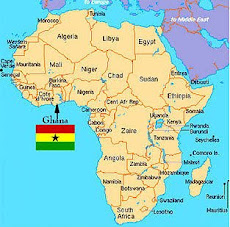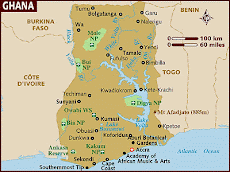We are now half way through our training. We’re learning a lot about the social, political and economic aspects of life in Ghana, as well as some useful tips about cultural expectations and behavioural norms. Most of us will be working in education in the upper 3 regions (Upper East, Upper West and Northern) and we recognise that there will be very real challenges in these areas:
• Formal education is much less developed than in the south. During colonial rule, Britain saw the north as the provider of labour, mainly for the cocoa plantations, so there was no advantage to the British in educating the northern population. For example, the first school in the north was built 200 years after school building started in the south of Ghana.
• 84% of the population in the north is undernourished. In addition, the “hunger gap” in the north can be as long as 5 or 6 months. This refers to the amount of time between food running out and the next harvest. The impact is that many northern people/families move south in search of work/food. Therefore regular school attendance is very low at these times.
• Only 50% of the teachers in the north have had any form of training and often resort to such things as corporal punishment. Teachers are also very poorly paid and sometimes the pay doesn’t arrive at all. Many therefore seek supplementary employment and teacher attendance at school is often very low as well.
• There is a big gender divide in terms of school attendance. The education of boys is more often seen as an investment for the family. Girls are more readily kept at home for various household and farm duties. The family gains from a dowry when the girl marries into another family, and therefore her education would not be of benefit to their own family. Once girls reach the age of about 8 or 9, their attendance at school declines rapidly.
Throughout our training in the UK and in Accra, there is a repeated emphasis on recognising the value of making very small steps, in terms of helping to develop education in the country. The government is working to improve school attendance by providing food at school, as well as free school uniforms. They have also introduced a scheme whereby everyone leaving university has to do a year’s “national service”, many as teachers or community mentors for people with disabilities. We understand that “Comic Relief” is also initiating a project in the north, focusing on education for the disabled.
We are going to be the first group of volunteers to pilot an assessment tool, which should enable the education service and individual schools to analyse their strengths and areas for development, and plan effectively for the future. This tool is being promoted by the government, in conjunction with VSO. One of our key roles in our 6 month placement will be to train education service staff and headteachers in the use of this tool, so that they can be more effective in planning future improvements. There is likely to be huge resistance to this sort of development in many quarters, so our skills will be stretched to the limit. We’ll let you know if we have any success at all.
Meanwhile, the facilities at this hotel are luxury, in comparison to our accommodation in Wa. There are several vegetarians among the volunteers and yesterday’s lunch was baked bean sandwiches. Lin is in heaven, as she thought she would have 6 months without baked beans!!
skip to main |
skip to sidebar



The views expressed in this weblog are the authors' own and do not necessarily reflect those of VSO.
Linda and Haydn

Welcome to our blog.
We used this blog to record some of our experiences in Ghana. There is no facility for adding your own comments. However, if you would like to keep in touch with us and/or have any comments or questions about anything, please feel free to email us. We'd love to hear from you. It is all over now and we are back in London with many happy memories and a deeper understanding of life in Sub Saharan Africa.
Africa

Ghana

Quotes
"History, despite its wrenching pain, cannot be unlived, but if faced with courage, need never be lived again" Maya Angelou
“Give a person a fish; you have fed them for today. Teach a person to fish; you have fed them for a lifetime. But help that person to get the fish to market and get a fair price and you have the potential for economic growth and sustained poverty reduction”. Barack Obama on the principles to apply to agriculture in Africa.
“Give a person a fish; you have fed them for today. Teach a person to fish; you have fed them for a lifetime. But help that person to get the fish to market and get a fair price and you have the potential for economic growth and sustained poverty reduction”. Barack Obama on the principles to apply to agriculture in Africa.